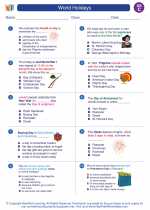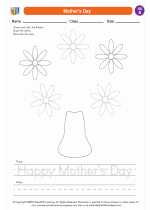Water
Water is a clear, odorless, tasteless liquid that is essential for all forms of life. It covers about 71% of the Earth's surface and is vital for various processes in the environment, including the water cycle, which involves evaporation, condensation, and precipitation.
Properties of Water
Water has several unique properties that make it essential for life:
- Universal Solvent: Water is known as the universal solvent because it can dissolve a wide range of substances, making it crucial for various chemical reactions in living organisms and the environment.
- High Surface Tension: Water has a high surface tension, allowing it to form droplets and support small insects like water striders on its surface.
- High Heat Capacity: Water can absorb and release large amounts of heat with minimal temperature change, helping to regulate Earth's climate and maintain stable temperatures in living organisms.
- Expands When Frozen: Unlike most substances, water expands when it freezes, making ice less dense than liquid water and allowing it to float, which insulates the water below and supports aquatic life in cold environments.
Uses of Water
Water serves various purposes, including:
- Drinking and Hydration: Water is essential for human and animal survival, serving as a vital component of bodily functions and overall health.
- Agriculture: Water is crucial for irrigating crops and sustaining agricultural production.
- Industrial Processes: Water is used in manufacturing, cooling, and energy production in various industries.
- Recreation and Transportation: Water bodies provide opportunities for recreation, such as swimming and boating, and serve as transportation routes.
Conservation of Water
Given the importance of water, it is essential to conserve this precious resource. Ways to conserve water include:
- Fixing Leaks: Repairing leaks in faucets, pipes, and irrigation systems can prevent water wastage.
- Using Water-Efficient Appliances: Installing water-efficient toilets, showers, and washing machines can help reduce water consumption.
- Watering Wisely: Using mulch, watering during cooler times of the day, and choosing drought-resistant plants can reduce outdoor water usage.
- Being Mindful of Consumption: Turning off taps when not in use, taking shorter showers, and using water responsibly in daily activities can contribute to water conservation efforts.
Study Guide
To study water effectively, consider the following questions:
- What are the unique properties of water that make it essential for life?
- How is water used in various aspects of human life, including agriculture, industry, and recreation?
- Why is it important to conserve water, and what are some practical ways to do so?
Additionally, students can explore the water cycle, the importance of clean drinking water, and the impact of human activities on water quality and availability as part of their study of this critical resource.
[Water] Related Worksheets and Study Guides:
.◂Social Studies Worksheets and Study Guides First Grade. Observance of Holidays

 Worksheet/Answer key
Worksheet/Answer key
 Worksheet/Answer key
Worksheet/Answer key
 Worksheet/Answer key
Worksheet/Answer key
 Worksheet/Answer key
Worksheet/Answer key
 Worksheet/Answer key
Worksheet/Answer key
 Worksheet/Answer key
Worksheet/Answer key
 Worksheet/Answer key
Worksheet/Answer key
 Worksheet/Answer key
Worksheet/Answer key
 Worksheet/Answer key
Worksheet/Answer key
 Coloring Worksheet
Coloring Worksheet
